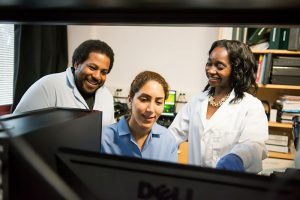There are amazing women doing incredible work in the field of Health IT. For instance, while working with the US Aid’s Global Health Fellows Program (GHFP) II for with the Public Health Institute, Seghen Haile M.P.S. ’16, Health IT, made her mark. She helped develop a mobile application to collect data from 44 countries to boost the reach of the President’s Emergency Plan for AIDs Relief (PEPFAR). In this week’s roundup, we share a list of 50 of the top enterprising women in Health IT. We also take a look at a newly launched tech innovation hub, employee retention and AI in dermatology.
Industry Roundup is brought to you by UMBC’s Division of Professional Studies, offering a broad array of professionally-focused master’s degree and certificate programs that address industry needs while anticipating future opportunities.
The Most Powerful Women in Healthcare IT for 2018

50 of the top enterprising women in Health IT have been announced in Health Data Management’s third annual recognition program. Check out who made the list.
Emory Healthcare to Launch Technology Innovation Hub

The Emory Healthcare Innovation Hub and its health IT partners will put patients at the core of care delivery. The intended outcome from this hub is to accelerate the development of evidence-based digital health solutions.
Is Money the Solution to Employee Retention?

Employees leave. It happens. But what about when they leave in numbers a bit too large to sustain the current balance? Do you spend more on compensation? Will that solve the problem? This study, conducted by Rubenstein et all in 2017, reviewed 316 studies on the causes of employee turnover. Their findings are interesting.
AI Outperforms Dermatologists in Diagnosing Skin Cancer

Researchers in the U.S., France and Germany have unanimously concluded that AI was better at diagnosing skin cancer than experienced dermatologists. Does this mean if you have possible skin cancer, you may want to think about having AI make the diagnosis over a dermatologist? Read on to come to your own conclusion. Interestingly enough, results of a recent study show that AI missed fewer melanomas than a team of experienced dermatologists.
